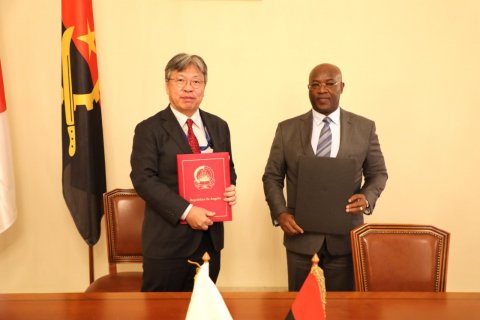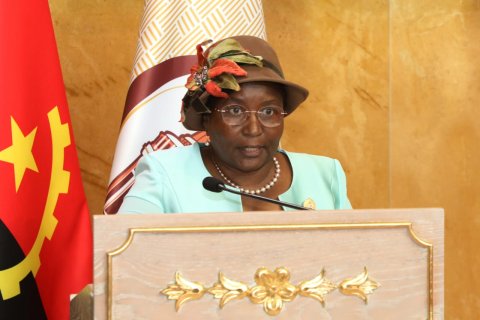"Um preto muito português", which hits bookstores this Thursday, is a kind of diary by João, known as Budjurra, son of Cape Verdeans, born in Lisbon, but who could be the son of Angolans, Mozambicans or Guineans.
Budjurra is a combination of several people that Telma Tvon, who was born in Angola in 1980 and has lived in Portugal since she was 13, knows. "Several people I grew up with, people I met when I was at college. It's a bit of a coming together of our various communities", she said, in an interview with Lusa.
Telma Tvon already wrote the book a few years ago – it had a first edition, in 2018, by Chiado Editora, and it is now published by Quetzal "with literary revision, carried out as per precept" – and when she did so she didn't have "the real perception of how it [Budjurra] has so many people."
"When the book came out, there were people who said things to me like 'you wrote the book of my life', 'it seems like you were talking about me'. It's more real than I could have thought. People who were born in Porto, in the Algarve, people with whom I had no contact whatsoever here in Lisbon, felt the same way", she shared.
Today she admits that at that time "perhaps she was a little naive" and wished that some of the episodes reported in the book, of racism, discrimination, physical and verbal aggression, had happened only to her own people, "so that there weren't so many people suffering from the really bad."
For Telma Tvon, the book's content will continue to make sense, as long as black people continue to "struggle with all the issues" there.
"As long as 12/13 year old kids from Amadora, Arrentela [in the municipality of Seixal], Monte da Caparica [Almada] feel less because of the color of their skin, because of their history, it will always make sense. Having this The opportunity to put the book up for discussion again is a gift for me," she said.
The approach of legislative elections in Portugal, scheduled for March 10th, and the fact that there are parties "that see immigration as an evil in this country", lead Telma Tvon to consider that "it is important to always talk about these issues".
Although the book is not autobiographical, Telma Tvon has already lived some of the episodes told there. "It's the story of our day-to-day lives as black people. It happens in something as simple as: I'm on the train, I make a comment and someone says 'you're not well, go to your country'".
The author doesn't believe it when she hears black people saying that they have never been victims of racism: "There are people who choose not to talk about it. It's a defense strategy: 'I'm not going to get hurt by it', 'I'm going to pretend it's not nothing with me'. But this happens to all people who have dark skin. Some decide to face the issue and say 'I went through this' and others say no."
Writing a book was not something that was in Telma Tvon's plans, who at the age of 16 became a rapper, later graduated in African Studies and then completed a master's degree in Social Work.
"Um preto muito português" started out as the lyrics of a song, which he wanted to record with the participation of Chullage and Lancelot, and it could have been one of many others he writes, but "end up not seeing the light of day".
She ended up showing the text, "which was already too long to be a song", to her sister who encouraged her to continue, not to cut anything. She continued and when she realized it she had 20 pages of Word written.
"She [sister] then asked me why I didn't release a book. But I had doubts about who would want to read stories like these. She told me: 'we. We, within our community, will want to read'. When we grew up we didn't Literature was so interesting, because there was nothing related to our realities. Our Fernando Pessoa was perhaps Pepetela, but it had nothing to do with our reality as immigrants", she recalled.
Telma Tvon and her sister left Angola in 1992, because of the Civil War, which lasted between 1975 and 2002.
In Portugal, they lived with their grandmother. Her mother stayed in Angola and spent several years without seeing her. "As things became more stable, I started going on vacation. I had that privilege, because I know many people who have never been able to go again," she said.
Although physically far away, she has "a very close relationship" with the country where she was born. "I live Angola every day, through the news, via Whatsapp, talking to my mother, my uncles, cousins. I feel like I'm not there, but I'm always there. And now that I'm working, whenever I can I go on vacation", said.
She doesn't plan on returning for good, even though he loves the country and the people who live there. What makes her stay in Portugal is the "complicated relationship" she has with power, "with the MPLA [party in Government since 1975], more precisely".
"I know that if I lived there I would have to swallow a lot of frogs, which I don't know if I'm prepared to swallow. I really admire the people who are there and have to be balancing act, because the situation requires it. I have a lot of respect for my people, but if In this regard, using an expression from there: I'm a bit of a 'soft cake'. I don't know if I would cope well, if I would have the resilience to be there", she shared.
When in Portugal someone tells you "go to your homeland", you don't know whether you feel more angry at whoever says it or whoever makes you have to hear it.
At a time when the discourse against immigration has gained ground in Portugal, Telma Tvon would like those who defend it to understand that "no one who is doing well in their country comes here" and "they don't come to impose anything on anyone".
Currently, Telma Tvon works to prevent school dropouts in social neighborhoods on the Sintra Line. Since he started working he has dedicated himself to projects related to young people.
When he moved away from rap he thought about what he could do that would give him pleasure and allow him to continue to have a voice.
"I went to study, I went to write and I went to work for our communities. From there came the love for Social Service, which was a way of being part of hip-hop. Combining social work with hip-hop and working with kids who hip-hop hop would work too", she said.
Hip-hop culture is essential in Telma's life. He says he breathes it every day. In the book there are references to 'rappers' such as Chullage, Nas or Tupac Shakur, and the lyrics of a rap by Gutto.
"When this song ["Ser Negro", which Gutto edited under the pseudonym Bantu on the compilation "TPC – Trabalho para Casa" (2000)] came out, it was an eye-opener for us, black people, within hip-hop culture. black people at that time, that song is an anthem. We all feel the lyrics like 'why did I never think that? Why did I never write that?'. He is speaking for all of us", she said.
"Um preto muito português" has not yet been presented – it will be presented on Saturday at the Correntes d'Escritas literary festival, in Póvoa de Varzim – and Telma Tvon has already written another book.
The book that follows, with no scheduled publication date yet, is "about women's stories".
"I tell stories of women – black – who are close to me, and others who are not so close, but have stories that impacted me. If this time I talked about a man, now I want to talk about several women. They are characters that I created, always inspired in the realities that I know", she said.







